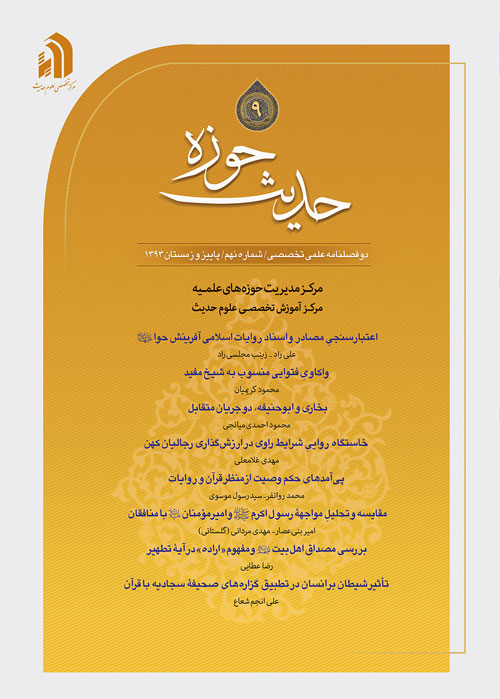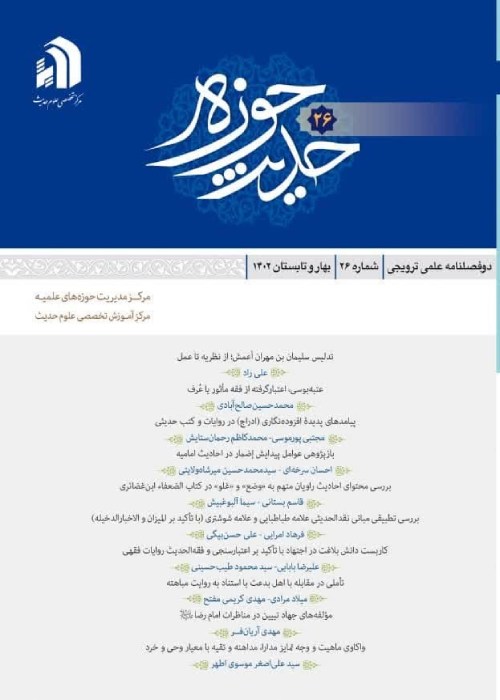فهرست مطالب

نشریه حدیث حوزه
پیاپی 9 (پاییز و زمستان 1393)
- تاریخ انتشار: 1394/01/20
- تعداد عناوین: 8
-
صفحه 30
-
Traditions on the Creation of Eve / Validation of the Documents and Resources of IslamicPage 5The creation of the early humans and the issues around it are discussed in all divine religions. They are also found in Islamic traditions but unfortunately the amalgamation of these texts with the Israelites has weakened the truth. A major research through pathology of Hadith، therefore، will help reveal the truth. The story of how Eve is created is one of the issues to be studied. The importance of studying this matter lies in the debasement of women taken from the literal meaning of some traditions. A study on Fariqain resources show that there two creation narratives about Eve. One tells us Eve was created from Adam’s rib and the other story holds that Eve was created from the clay leftover after Adam was made. According to what the pathology of the resources as well as a research on the authenticity of Hadith documents of both narratives shows، there are discrepancies found in the traditions which need to be examined.Keywords: Eve (s), rib, clay leftover, pathology, resources, documents.
-
Page 30In recent decades, there has been a fatwa known and attributed to Shaykh Mufid which is in the form of a story and tries to prove there is a relation between Imam of the time, Imam Mahdi (ajtf) and Shaykh Mufid. The oldest text narrating this story is less than 150 years old. After a little bit of pondering over the story and its consequence, you will find out that it’s not true and can’t be attributed to Shaykh Mufid or at least the authenticity of it is open to serious doubt. This paper is to critique and study the aforementioned fatwa in order to block more publication of the story.Keywords: Shaykh Mufid, narrative, signature, visit
-
Page 42Death of Prophet Muhammad (saww) led to a split within Muslim community over the leadership and succession to Rasoul Allah (saww) on political, scientific and religious issues. Some people just pledged allegiance to the Ahlul Bayt of Rasoul and became the Shias of Ali (a.s). Abū Hanifa as the representative of the Ahl al-Ra’y wa-l-Qiyas and Buhari, the leading figure of the Ahl al-Hadith were two opposites. Bukhari, in the book Sahih, disagrees with Abū Hanifa and tries to prove that the decisions made by Abū Hanifa are against the Holy Prophet’s traditions (saww). The purpose of this paper is to study the view of Bukhari and the scholars of Ahl al-Hadith about Abū Hanifa.Keywords: Abū Hanifa, Bukhari, Ahl al Ray wa, l, Qiyas, Ahl al Hadith
-
Page 62The purpose of this study is to prove that the prior (mutaqaddim) Shia evaluators of hadith narrators were committed to sayings of the Infallibles in “how to evaluate the narrators”. It seems that the way of deciding the authenticity or weakness of a hadith by the prior evaluators is rooted in a framework of conditions which the Infallibles planned for the narrators to be as the condition of necessity or at times the condition of perfection. Such narrative conditions have not yet been discussed exclusively. Four conditions mentioned in the traditions are: honesty, collection, Shiism and knowing the aspects of the issue. These conditions are manifested in the word “reliable”, in sayings of the Infallibles and accordingly in the books written by the evaluators of hadith narrators. In view of some prior evaluators, reliability of the narrators should be examined carefully and is considered “inter-religious trust in the narrator’s hadith”. Trust in weak narrators can be in some cases included as well.Keywords: the conditions of narrators, traditions evaluating the narrator, al, jarh wa, l, tadil (criticism, praise), prior evaluators of hadith narrators
-
Page 79The last will and testament is upon every Muslim by Sharia Law and has social, ethical and economical implications. It establishes justice, supports the needy, prevents disparities, helps fulfill promises, strengthens family ties, makes up for shortcomings during one’s lifetime, readies for death, manages after-death affairs, ensures continuity of good deeds, corrects economic system, decreases social class differences, helps pay off the debts and provides economic security.Keywords: last will, testament, social ethics, economic ethics, narrative interpretation
-
Page 105Muslim community, from the time Islam appeared up to now, has always been suffering from hypocrisy (nifaq). Rasoul Allah (saww) and Amir al-Mu’mineen (a.s) whose mission was to lead the Muslim Ummah during two different periods of time, sought a confrontation with the hypocrites and tried hard to reveal what they did and neutralized them. An issue which is not paid enough attention to is that if there is a difference between the way Rasoul Allah (saww) and Amir al-Mu’mineen (a.s) confronted the hypocrites. This paper, comparing and studying these two confrontations, is to show that the intensity level used by Amir al-Mu’mineen (a.s), forced by circumstances, in an confrontation with the hypocrites had been more than that used by Rasoul Allah (saww) in his time.Keywords: hypocrisy, interaction with the hypocrites, the Holy Prophet (saww), the hypocrites, Imam Ali (a.s), the hypocrites
-
Page 118The 33rd verse of Surah “al-Ahzab” talks about God’s will to purify the Ahlul Bayt (a.s) with extensive purification. Differences in the pronouns of part of this verse with the previous and next verses have led to different viewpoints in deciding the evidence of Ahlul Bayt and the concept of “will” in the verse of purification. The verse of purification is a key for the Quranic proof of “Ismah” (protection), hence, it seems necessary to do some major research on the issue. The purpose of this paper is to decide the concept of “will” and to know the evidence of those who reached the level of “Ismah” and purity with a will and for the purity they have gained, they can be a reliable source in scientific, religious and political issues of society. The research and study on the Islamic texts achieved its goal of deciding the evidence of Ahlul Bayt and of proving the evolutionary will in the form of Sharia (not free from or negating Sharia). Accordingly, it is proven that the Ahlul Bayt’s voluntary purification goes along with God’s definite declaration.Keywords: Ahl al Kisa, evil, evolutionary, Sharia will, Ismah, free will, Hadith interpretation, Quran, Hadith Sciences
-
Page 143Quran introduces Satan through covering different aspects of his evil deeds. Sahifa Sajjadiya side by side with Quran discusses precious concepts about demonology of which the seventeenth supplication is to know Satan. The present paper therefore studies words of Imam Sajjad (a.s) about the effects of Satan on human beings in Sahifa Sajjadiya. Almost two-thirds of the paper is given to Satan’s efforts at the deviation of human’s thought and action presented in the form of different statements pointed out by Imam Sajjad (a.s). This piece has collected all the aforementioned texts from Sahifa Sajjadiya and has analyzed them referring to the verses of the Noble Quran. We deemed it necessary to prepare this paper regarding Allah’s command on knowing Satan as well as his ways with which he makes human beings swerve.Keywords: demonology, Imam Sajjad (a.s), temptation, supplication, Quran, Hadith Sciences


